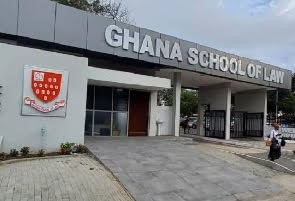The longstanding Ghana School of Law monopoly is facing renewed criticism, with leading legal expert and Democracy and Development Fellow at CDD-Ghana, Professor Stephen Kwaku Asare, demanding immediate and sweeping reforms.
In a powerful call to action, Prof. Asare warned that Ghana cannot afford to waste another year maintaining a legal education system that he described as outdated and unfair.
According to him, the time has come to dismantle the Ghana School of Law’s stranglehold on professional legal education and open up the sector to innovation and growth.
“Legal education reform is urgent: It is neither sustainable nor fair to force every LLB graduate through a single, non-university institution with limited capacity — while accredited universities, equipped with moot courts, clinics, and interdisciplinary programs, are sidelined.”
The monopoly maintained by the Ghana School of Law, he argued, is not just inefficient but also a serious bottleneck to Ghana’s justice delivery system.
He noted that across the country, district courts remain critically understaffed, and major national projects like the Operation Recover All Loots (ORAL) are hindered by the lack of qualified prosecutors.
The nation’s legal capacity is under strain — not because of a lack of students or willingness, but because of unnecessary barriers to professional training.
Prof. Asare emphasized that Ghana’s legal education challenges are not unique, noting that other countries have faced and addressed similar issues.
He cited Kenya as a compelling example, explaining that the Kenyan courts recently dismantled the Kenya School of Law’s monopoly over professional legal training.
By declaring the arrangement unconstitutional, the courts paved the way for accredited universities to also train advocates, thereby promoting greater access, competition, and fairness within the legal education system.
The law expert suggested that Ghana could draw valuable lessons from such reforms to strengthen its own approach to legal education. “We must not be left behind,” he said.
Furthermore, Prof. Asare outlined a clear and practical alternative. He argued that Ghana could easily follow Kenya’s example by allowing students to complete their professional training at accredited universities.
To maintain high standards, he proposed the introduction of a national Bar Examination, to be administered twice a year, assessing core common law knowledge, legal research abilities, and essential practical skills needed for real-world practice.
This approach he said offers a simple yet transformative path to reform, arguing that it would ensure quality without stifling opportunity, allowing the best candidates to rise based on merit, not based on access to a limited number of slots controlled by a monopoly.
“The market is ready: Students are eager to learn and are ready to pay. Universities are prepared to teach and need the opportunity. There is demand. There is a supply.
“Why should we let a moribund GLC distort what we all learned from Yaw Asante’s Economics Without Tears?” he remarked.
Prof. Asare emphasized that the need for reform cannot be postponed any longer. He warned that continued delays would only trap another generation of talented young Ghanaians in a system that stifles their potential and slows the country’s legal advancement.
According to him, Ghana cannot afford to waste another academic cycle or continue sidelining capable students who are eager to serve.
He called for immediate action, stressing that bold reforms are essential to unlocking the future of the nation’s legal profession and driving meaningful progress.
His call is not merely a suggestion — it is a demand grounded in the dire realities facing Ghana’s legal system.
The country needs more trained lawyers, and it needs them urgently. Preserving an outdated monopoly when there are easier, fairer, and proven alternatives elsewhere, according to Prof. Asare, is indefensible.
He ended his passionate plea with a resounding rallying cry: “End the monopoly now!; Expand opportunity now!; Reform legal education now!”
As the pressure mounts, it remains to be seen whether Ghana’s legal authorities will listen — or risk being remembered as the generation that chose inertia over progress.


